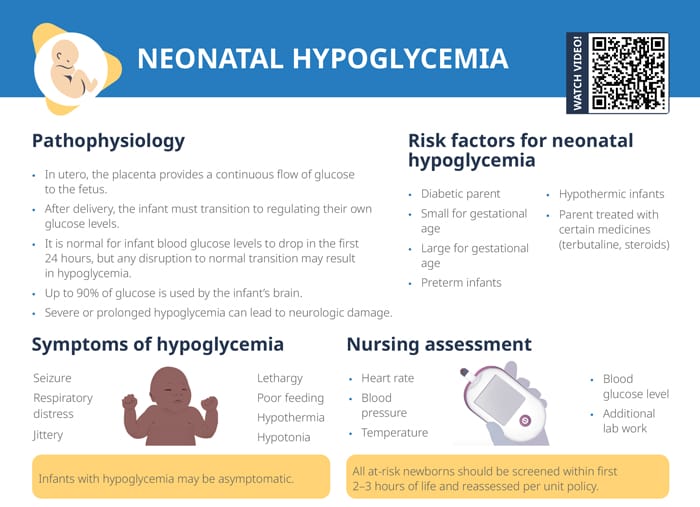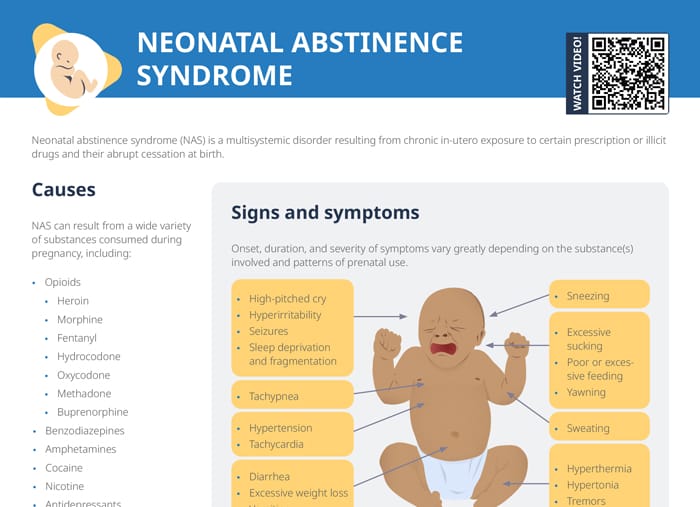What is neonatal abstinence syndrome?
Neonatal abstinence syndrome (NAS) is a multisystemic disorder resulting from chronic in-utero exposure to certain prescription or illicit drugs and their abrupt cessation at birth.
Causes of NAS
NAS can result from a wide variety of substances consumed during pregnancy, including:
- Opioids
- Heroin
- Morphine
- Fentanyl
- Hydrocodone
- Oxycodone
- Methadone
- Buprenorphine
- Benzodiazepines
- Amphetamines
- Cocaine
- Nicotine
- Antidepressants (SSRIs, SNRIs)
Is neonatal abstinence syndrome a disability?
NAS itself is not a disability, but a temporary condition that newborns experience after being exposed to addictive substances during the pregnancy. However, more severe cases can come with co-occurring conditions that may result in long-term problems or disabilities.
Long-term effects of neonatal abstinence syndrome
Some of the long-term effects of neonatal abstinence syndrome can include:
- Developmental delays
- Behavioral and learning problems
- Possible issues with growth, feeding, development, hearing, and vision
- Increased risk of SIDS
Symptoms of neonatal abstinence syndrome
Onset, duration, and severity of symptoms vary greatly depending on the substance(s) involved and patterns of prenatal use.
List of potential symptoms of NAS:
- High-pitched cry
- Hyperirritability
- Seizures
- Sleep deprivation and fragmentation
- Tachypnea
- Sneezing
- Hypertension
- Sweating
- Tachycardia
- Diarrhea
- Excessive weight loss
- Vomiting
- Excessive sucking
- Poor or excessive feeding
- Yawning
- Hyperthermia
- Hypertonia
- Tremors
Nursing diagnosis for neonatal abstinence syndrome
Possible nursing diagnoses for clients with NAS
- Ineffective infant feeding pattern related to hyperirritability, poor sucking reflex
- Disturbed sleep pattern related to hyperexcitability and discomfort
- Impaired comfort related to withdrawal symptoms
- Risk for imbalanced nutrition: less than body requirements due to feeding difficulties
- Delayed growth and development
- Caregiver role strain
Nursing interventions
The first-line treatment of NAS is non-pharmacological. Nursing interventions include:
- Keep the parent-infant dyad together through rooming-in.
- Educate and involve parents in all aspects of infant care.
- Encourage breastfeeding unless there is an absolute contraindication. Facilitate access to human donor milk, as needed.
- Increase frequency of feeding and/or supplement with calorie-dense formula to meet increased energy requirement.
- Facilitate frequent skin-to-skin contact, kangaroo care.
- Reduce stimuli: Cluster care, dim lights, reduce noise.
- Vertical rocking, side-lying C position, and swaddling may reduce irritability and hypertonicity.
- Individualize interventions to infant’s symptoms/response.
If pharmacological options are used, treatment is aimed at improving withdrawal signs in the short-term and weaning as soon as NAS signs and symptoms are well controlled. There is no consensus regarding preferred agent, regimen, or weaning protocol.
Example nursing care plan for neonatal abstinence syndrome
- Assessment: recognizing signs of NAS such as high-pitched crying, irritability, tremors, or seizures
- Diagnoses (see above)
- Plan actions to ensure adequate nutrition and hydration while alleviating withdrawal symptoms
- Interventions (see above)
- Evaluate the effectiveness of the interventions. Close interdisciplinary follow-up is necessary after discharge to meet the complex health needs of the parent-infant dyad and connect them to community resources.

